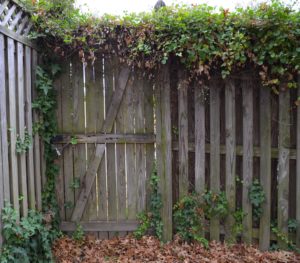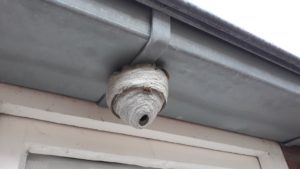Mosquito Joe Takes the Sting Out of Your Yard
Carpenter Bee Control
Are Carpenter Bees Harmful?
Carpenter bees are territorial in nature and females will often return to the same areas from which they emerged to begin a new chamber, or nest, of their own. This is because it is a lot easier for them to build upon an existing nest than it is to dig a new hole. Although carpenter bees are less aggressive than wasps, female bees supplying their nests will sting. Males on the other hand do not sting; however, they often hover close to people and are especially attracted to sudden movements but do no more than creating fear.
Why Do Carpenter Bees Make Holes in Wood?
Carpenter bees prefer to attack wood that is bare, weathered and unpainted. Areas around your home that may be preferable to carpenter bees are your porch, deck, roof eaves, wooden sheds, and other exposed areas. Structures that are used for nesting year after year may suffer considerable damage.
How to Treat for Carpenter Bees
Mosquito Joe of Gahanna provides treatment to the galleries to break the life cycle and reduce the population. After the treatment we highly recommend the following to ensure that these areas are not targeted again:
- Paint all exposed wood surfaces, especially those which have a history of being attacked.
- Plug the entrance hole with a piece of wooden dowel coated with carpenter’s glue, paintable silicone caulk or wood putty. This protects against future over-wintering in old nesting tunnels and reduces the chances of wood decay.
Wasp Removal
What’s Up with Wasps?
There are two main categories of wasp: social and solitary, with many different species within these two groups. Most of the wasps flying around your house, or place of business, are either Mud Daubers or Umbrella Wasps. Mud Daubers tend to be black with lighter markings and have a distinctively thin waist that connects their abdomen and thorax. Umbrella wasps, or paper wasps, look more like yellow jackets except they have much longer bodies.
Wasps are fairly docile and will not sting unless they are aggressively handled. They are not pollinators and are usually out hunting spiders, small insects, sugars from soda or plants, and gathering materials to build their nests.
Wasp Nest Removal
Wasp nests can be found in a variety of places both above and underground depending on the type of wasp. Wasp nests above ground can usually be identified by their grey color and swirl-like appearance. The opening of their underground nests usually has a cone-shaped pile of dirt with a large opening where the wasps enter.
Regardless of the type of nest, Mosquito Joe of Gahanna has a solution to rid your yard of wasps. Our trained technicians will inspect your property and then utilize the needed tools and products to eradicate each nesting population around your home or place of business.
Yellow Jacket Elimination
Learn More about Yellow Jackets
Yellow jackets are found worldwide, and there are about 16 species that reside in the U.S. They can typically be identified by the yellow and black pattern around their abdomens, although some may show white and black colors and have a thin waist. They are social insects that have annual colonies, however, only the queen lives through winter to start a new colony in the spring.
Where Are Yellow Jacket Nests Found?
Yellow jackets typically build their nest in the ground near roots or where the dirt is soft. They are very territorial, so if there are strong vibrations near the nest or if the nest is accidentally stepped on, they will attack. The yellow jacket sting is known to be painful, and some may have can have an allergic reaction to the sting.
Yellow Jack Control for Your Yard
Mosquito Joe has a solution to rid your yard of these stinging insects. Our trained service professionals will inspect your property and use the necessary steps and repellents to rid your yard of each yellow jacket nesting population.
Mosquito Joe of of Gahanna Can Help
Call Mosquito Joe of Gahanna at 614-407-3531 or fill out the Request a Quote form in order to rid your yard of stinging insects like carpenter bees, wasps, and yellow jackets! Take the sting out of being outside and get back to enjoying outdoor spaces at your home or business.




